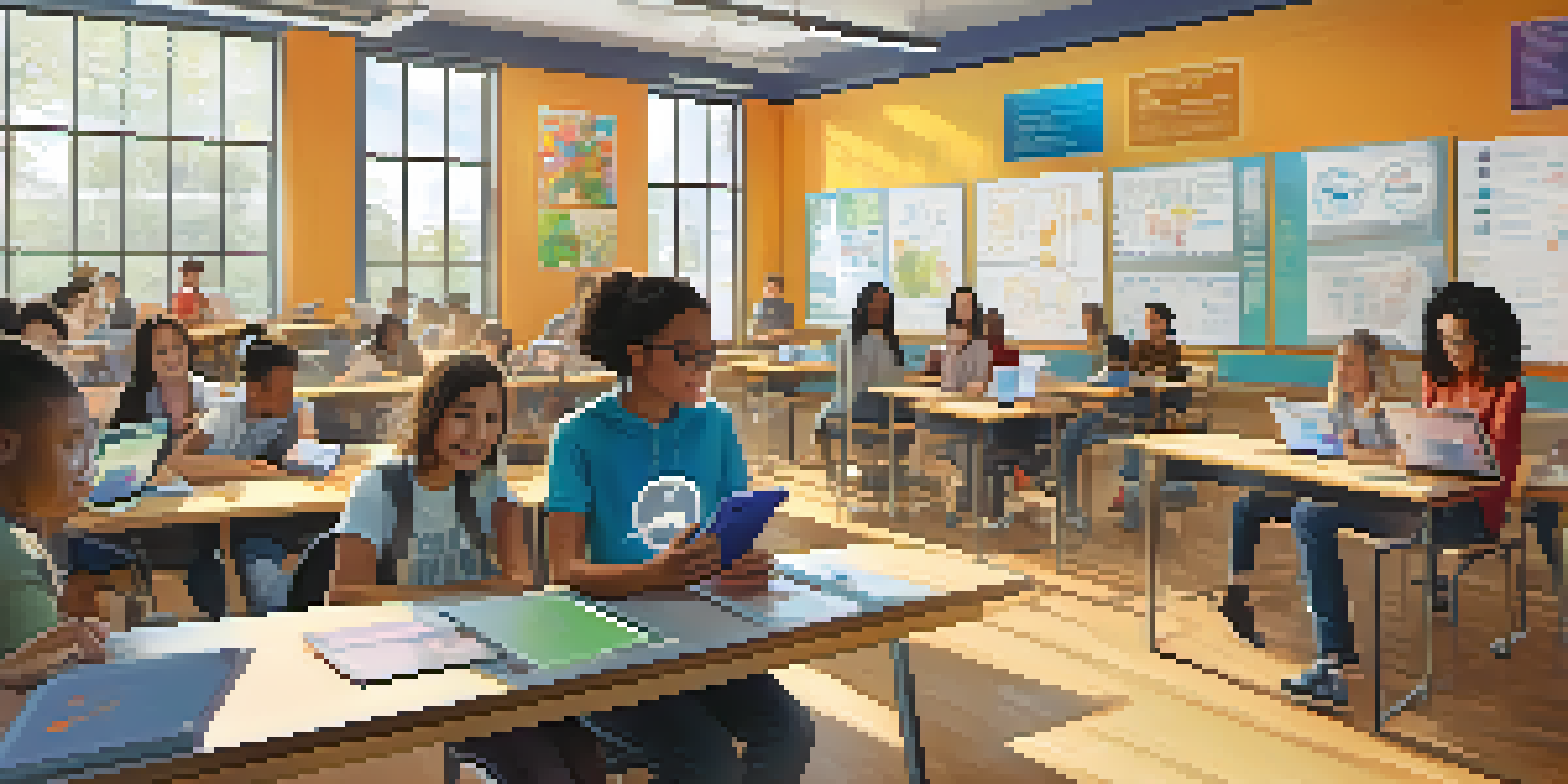Adaptive Learning Technologies: AI for Individual Progress

Understanding Adaptive Learning Technologies and AI
Adaptive learning technologies leverage artificial intelligence to tailor educational experiences to individual learners. By assessing a student's strengths and weaknesses, these systems can modify content in real-time, ensuring that learning is both efficient and effective. This approach contrasts with traditional learning methods, where one-size-fits-all materials often fail to meet diverse student needs.
Education is not the filling of a pail, but the lighting of a fire.
At its core, adaptive learning is about personalization. Just as a good teacher knows when to challenge a student or offer additional help, AI-powered tools can dynamically adjust the difficulty of tasks or suggest resources that match a student's unique learning pace. This creates a more engaging and relevant educational journey.
Moreover, as students interact with adaptive learning systems, these tools gather data on their performance and preferences. This data-driven insight not only helps in crafting individual learning paths but also allows educators to better understand group trends, enhancing overall teaching strategies.
The Role of AI in Enhancing Educational Experiences
AI plays a pivotal role in enriching educational experiences by providing immediate feedback to learners. Imagine a student working on math problems who receives instant hints and explanations based on their mistakes, promoting a deeper understanding of concepts. This immediate interaction fosters a sense of achievement and encourages continuous learning.

Additionally, AI can analyze vast amounts of data to identify common challenges faced by students. By recognizing patterns in learning difficulties, educators can adjust their teaching approaches or provide targeted interventions, ultimately leading to improved student outcomes. This proactive strategy contrasts with reactive measures that only address issues after they arise.
Personalized Learning Enhances Engagement
Adaptive learning technologies tailor educational experiences, fostering greater student motivation and ownership of their learning.
Ultimately, the integration of AI into education not only enhances individual learning but also empowers teachers. With AI handling repetitive tasks and providing insights, educators can focus more on mentorship and creativity, making the classroom a more dynamic and supportive environment.
Benefits of Personalized Learning Approaches
Personalized learning approaches, driven by adaptive technologies, lead to enhanced student engagement. When students feel that learning is tailored to them, they are more likely to take ownership of their education and stay motivated. This intrinsic motivation can be a game-changer in a learner's academic journey.
The only thing worse than training your employees and having them leave is not training them and having them stay.
Moreover, personalized learning can help bridge gaps for struggling students. By adjusting the learning path according to each individual's pace, those who may have fallen behind can catch up without feeling overwhelmed. This inclusive approach fosters a more equitable learning environment.
Additionally, personalized learning promotes a growth mindset. When students experience tailored challenges that are just right for them, they learn to embrace effort and resilience. This mindset not only aids in academic success but also prepares them for future challenges beyond the classroom.
Challenges in Implementing Adaptive Learning Technologies
While adaptive learning technologies offer remarkable benefits, their implementation comes with challenges. One significant hurdle is the initial investment in technology and training. Schools and institutions must consider the costs associated with software, hardware, and staff development to effectively integrate these tools.
Another challenge is data privacy and security. With adaptive systems collecting sensitive information about student performance, ensuring that this data is protected is paramount. Educators and administrators must navigate regulations and best practices to safeguard student information.
AI Empowers Teachers and Students
By providing immediate feedback and insights, AI enhances individual learning while allowing educators to focus on mentorship and creativity.
Lastly, there can be resistance to change from educators accustomed to traditional teaching methods. Transitioning to an adaptive learning model requires a shift in mindset and an openness to embrace technology, which can take time and support to cultivate.
Success Stories: Institutions Thriving with Adaptive Learning
Many educational institutions have embraced adaptive learning technologies with remarkable success. For instance, a prominent university reported a significant increase in student retention rates after integrating an AI-driven platform that tailored coursework to individual needs. This success underscores the potential of adaptive learning to enhance educational outcomes.
Another example is a high school that implemented an adaptive reading program, leading to improved literacy skills among struggling readers. By personalizing reading materials and pacing, students were able to engage more with texts, resulting in greater confidence and proficiency.
These success stories highlight that when adaptive learning technologies are thoughtfully implemented, the results can be transformative, paving the way for a more effective and inclusive educational landscape.
The Future of Education: Trends in Adaptive Learning
The future of education is bright, especially as adaptive learning technologies continue to evolve. One promising trend is the increased integration of virtual and augmented reality, allowing students to engage with content in immersive ways. Imagine learning about history by virtually walking through ancient civilizations—this is becoming increasingly possible thanks to technology.
Another trend is the rise of collaborative adaptive learning, where students can work together in personalized learning environments. This fosters teamwork and communication skills while still catering to individual learning paths, making education both social and tailored.
Challenges of Implementing Technology
Despite the benefits, adopting adaptive learning technologies poses challenges such as initial costs, data privacy concerns, and resistance from traditional educators.
Finally, as AI continues to improve, we can expect even more sophisticated analytics that help teachers understand student needs better than ever. This evolution will undoubtedly lead to more effective teaching strategies and ultimately, a more enriched learning experience.
Conclusion: Embracing the Power of Adaptive Learning
Embracing adaptive learning technologies represents a significant step forward in education. By harnessing AI to provide personalized experiences, we can address the diverse needs of learners and promote lifelong success. The benefits of tailored learning are clear, from increased engagement to improved outcomes.
However, as we move forward, it's crucial to recognize and address the challenges that come with these advancements. By investing in technology, ensuring data protection, and supporting educators through the transition, we can create an environment where adaptive learning thrives.

As we look to the future, the potential of adaptive learning technologies is boundless. Together, we can shape an educational landscape that empowers every learner to achieve their fullest potential.